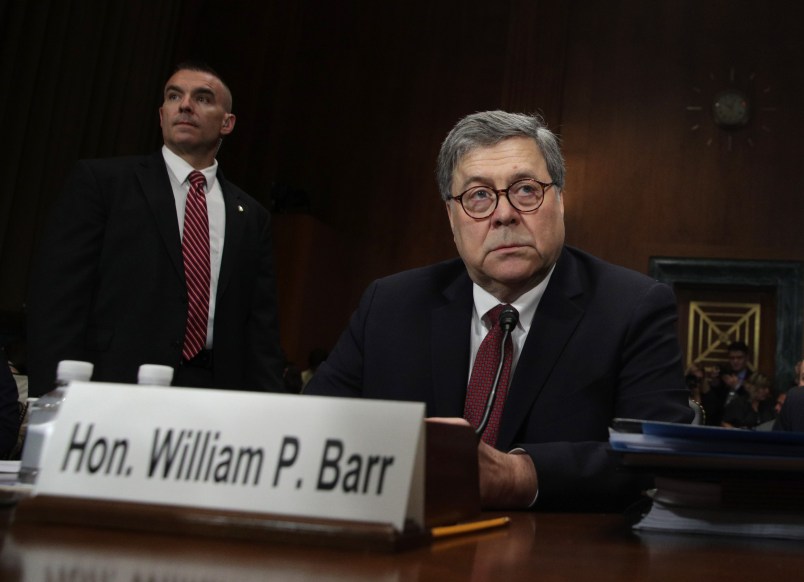In Attorney General Bill Barr’s telling, it is special counsel Robert Mueller’s fault that the attorney general, and not the special counsel, made the ultimate call on whether President Trump obstructed justice.
At hearing Wednesday in front of the Senate Judiciary Committee, Barr recalled being “surprised” when Mueller told him at a March 5 meeting that the special counsel was “not going to reach a decision on obstruction.” Mueller would ultimately submit his full report to Barr later that month.
“We asked them a lot about the reasoning behind this and the basis for this,” Barr said, of the March 5 meeting. “Special counsel Mueller stated three times to us in that meeting, in response to our questioning, that he emphatically was not saying that but for [a DOJ opinion barring the indictment of a sitting president], he would have found obstruction.”
Barr claimed that Mueller’s team told him they were still “formulating” their explanation for not coming to a conclusion on criminal obstruction. However, Barr himself felt like it was a prosecutor’s job to make a call one way or another, he said in his testimony.
“The powers [Mueller] was using, including the power of using the grand jury and using compulsory process exists for that purpose, the function of the Department of Justice in this arena, which is to determine whether or not there has been criminal conduct,” Barr said. “It’s a binary decision. Is there enough evidence to show a crime? And do we believe a crime has been committed? We don’t conduct criminal investigations to just collect information and put it out to the public. We do so to make a decision.”
He took a shot at Mueller for continuing an obstruction probe, which examined conduct that occurred in 2018, if he was not going to make a prosecutorial decision.
“Why were those investigated if, at the end of the day, you weren’t going to reach the decision?”
Barr’s decision to formally clear Trump of criminal obstruction was striking given that Mueller discussed at length in his report why he felt unable to say one way or another whether Trump’s conduct amounted to crime.
An opinion by the Department of Justice’s Office of Legal Counsel (OLC) that bars the indictment of a sitting president weighed on how Mueller approached the obstruction probe. Mueller considered the fairness of accusing the President of a crime when Trump would not have the venue of a trial to rebut the allegations, given that the special counsel was unable to charge him due to the OLC opinion. Because of those and other factors, Mueller had determined he’s team would “not make a traditional prosecutorial judgement,” and therefore, would “not draw ultimate conclusions about the President’s conduct.”
While the evidence and circumstances had presented Mueller’s team with “difficult issues” they would need to resolve if they were to make a prosecutorial judgement, they would have said in their report if the investigation had led them to conclude the President had not obstructed justice.
“Based on the facts and applicable legal standards, we are unable to reach that judgement,” the report said.
Rather than let speak for themselves the limitations Mueller put on his obstruction probe, Barr took it upon himself to deem the evidence Mueller turned up insufficient to bring charges — with or without the OLC opinion.
Barr, in a letter to Congress last month, said he made the call that Trump’s conduct could not be prosecuted with Deputy Attorney General Rod Rosenstein and in consultation with OLC experts. He said OLC opinion was not a factor in their prosecution, a point that may have been technically true. But at a press conference just before the Mueller’s report itself was released, he went a step farther and made claims about how Mueller viewed the OLC opinion that have been hard to square with the report itself.
“We specifically asked him about the OLC opinion and whether or not he was taking a position that he would have found a crime but for the existence of the OLC opinion,” Barr said. “And he made it very clear several times that that was not his position. He was not saying that but for the OLC opinion, he would have found a crime.”










